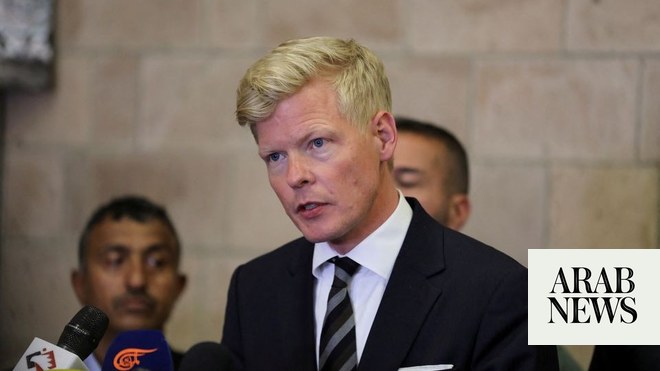
After fruitless meetings in Sanaa, Muscat, Riyadh, Geneva and Kuwait, will the Yemen peace talks in Stockholm be any different? Despite a different UN special envoy to Yemen, and a new drive by the international community to settle the conflict, the talks in Sweden are unlikely to yield much.
Martin Griffiths, the new UN envoy, will try his luck but the situation on the ground remains unchanged and therefore I doubt the Iran-aligned Houthis are in the mood to yield to power-sharing or to equal representation in a united and peaceful Yemen that will coexist and cooperate with its neighbors.
Since the uprising in Yemen broke out in early 2011, the UN has been trying to help Yemenis find a peaceful solution. It supported negotiations between the government and the opposition, resulting in the signing of the Gulf Cooperation Council Initiative and its implementation mechanism in Riyadh in November 2011. Since then, four UN Security Council resolutions have been voted on, but none have made it as far as being acted on by the warring parties.
Griffiths joined the fray after two previous UN envoys tried but failed to bridge the gap between the Houthi militia and the elected government of Abed Rabbo Mansour Hadi, which is now in exile and supported by the Saudi-led Arab coalition. Encouraged by new international resolve, Griffiths hopes to revive the peace process that will ultimately lead to a negotiated transition and power-sharing based on UN Security Council Resolution 2216.
In Stockholm, Griffiths hopes to present his updated version of the “Framework for Negotiations,” which it is hoped will help the warring parties agree on a road map that will lead to an end to the war and a transitional deal. The framework, we are told, will include interim security and political arrangements, and the return of Yemen’s friendly relations with neighboring states and the restoring of state institutions.
Griffiths hopes to go beyond the mere normalization of Yemen, as he hopes that his framework will ideally lead to principled compromises that will allow the people of Yemen to live again in peace. What the new UN envoy has not explained are the guarantees, if any, that he has received from the Houthi militia and its patron Iran to facilitate such a deal. Military experts would ask, since the Houthis have not suffered great losses and still have a firm grip on power in all strategic provinces from Saada close to the Saudi border all the way to Taiz in the south, why would they suddenly have the appetite to concede and share power?
As Secretary of State Mike Pompeo said to Congress, the issue of Yemen and other hotspots in the Middle East are directly linked to Iran
Mohamed Chebaro
Iran might be minded to show flexibility in Yemen after the noose of US sanctions was tightened again this month, but at what price? All indications point to a less compromising Tehran after the reimposition of US sanctions. From Afghanistan to Iraq and through to Syria, Lebanon, Yemen and Gaza, Iran’s allies are not interested in compromising, sharing power, facilitating government formation, or the voting in of transition governments.
Saudi Arabia, the party most affected by the Yemen conflict — as more than 200 ballistic missiles have been launched toward its southern provinces and even its capital Riyadh — has repeatedly expressed its willingness to seek a political settlement that protects Yemeni unity and stability in the Gulf region.
There is now mounting pressure in the US for Washington to end its support for the Arab coalition in Yemen. By a bipartisan 63-37 vote, the Senate on Wednesday opted to move forward with legislation calling for an end to US involvement in Yemen, despite President Donald Trump’s opposition. But, as Secretary of State Mike Pompeo said to Congress, the issue of Yemen and other hotspots in the Middle East are directly linked to Iran; and any drawdown by US lawmakers against Saudi Arabia would lead to a stronger Iran in the region.
Griffiths insists that he has received assurance from the various Yemeni parties, including the Houthis and Hadi’s government, that they will attend the talks in Stockholm. But the real assurance that seems to be missing is the green light from Tehran, the Houthis’ main ally, about facilitating such a deal. The odds are that the negotiations will go ahead, but the secret potion to replace rivalry with peace is still elusive.
The Yemen conflict is one flashpoint among many where Iran is meddling in its neighbors’ internal affairs and, unless a global approach is taken to accommodating Iran’s needs and interests with those of its neighboring states, peace talks will be a waste of time. The nuclear deal to curb Iran’s nuclear ambitions, which was brokered by the Obama administration, could have been an occasion to review and redraw the limits of Iranian influence in the region. That opportunity has been missed, and the Yemen conflict is unlikely to trigger a process to clip Iran’s wings.
Griffiths believes there is a genuine drive from all sides to join the forthcoming Stockholm consultations, but all indicators — short of a major shift in the theater of war — point to the fact it is unlikely all parties will be swayed to compromise — at least not yet.
Mohamed Chebaro is a British-Lebanese journalist with more than 25 years’ experience covering war, terrorism, defense, current affairs and diplomacy. He is also a media consultant and trainer.
Disclaimer: Views expressed by writers in this section are their own and do not necessarily reflect Arab News" point-of-view









